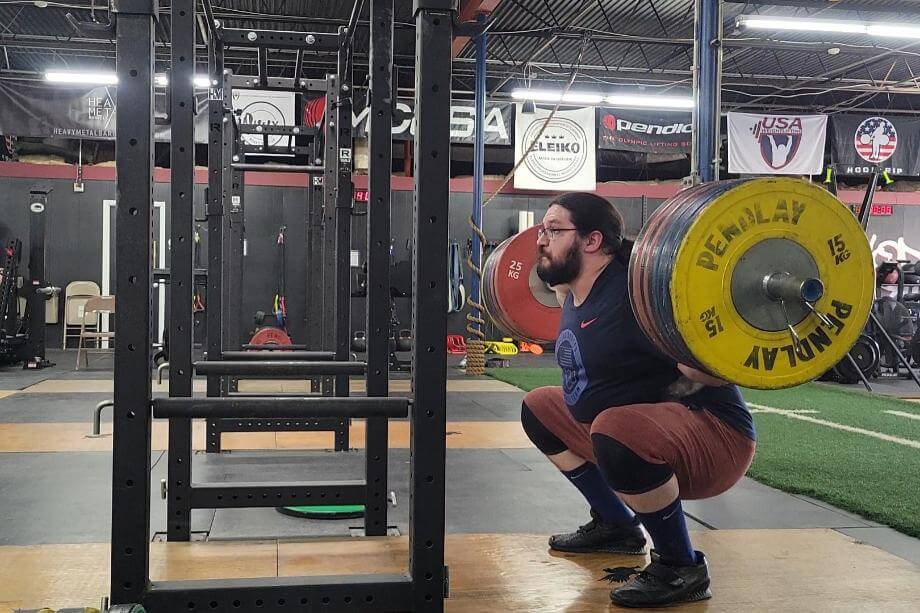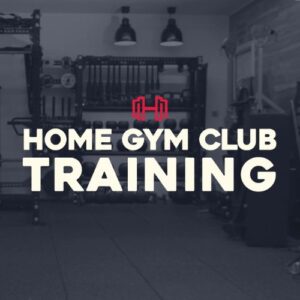We test and review fitness products based on an independent, multi-point methodology. If you use our links to purchase something, we may earn a commission. Read our disclosures.
You don’t earn a nickname like “The Quadfather” by skipping leg day.
Renowned for his unparalleled leg development, Tom Platz’s name is synonymous with the epitome of strength and sculpted lower body musculature in the realm of professional bodybuilding—just google his name and see for yourself if you’re unfamiliar with the massive quads and chiseled V-taper of “The Golden Eagle.” Tom Platz’s leg workouts echo through fitness circles as a testament to his legendary dedication to leg training and influence on many workout routines. His relentless commitment to building massive quadriceps and overall lower body strength has made his leg training iconic.
I’m here to break down the Tom Platz leg workout, offering you my advice as a certified strength and sports coach (CSCS). I’ll also cover the benefits of his leg training regimen and toss some modifications your way just in case you aren’t quite up to the challenge—yet.
Get your best weightlifting shoes laced up and ready for the gym, baby; it’s time to venture through Tom Platz’s leg day workout!
Who Is Tom Platz?
Tom Platz, hailing from Fort Sill, Oklahoma, isn’t just a name in bodybuilding; he’s a legend. Platz carved his path to fame during the dynamic era of the late 1970s and 1980s old-school bodybuilding scene. What sets him apart? Well, his massive, awe-inspiring quadriceps that became the stuff of bodybuilding folklore. While he never clinched the coveted Mr. Olympia title, Platz secured a third-place finish in the 1981 Mr. Olympia, accompanied by six top 10 finishes.
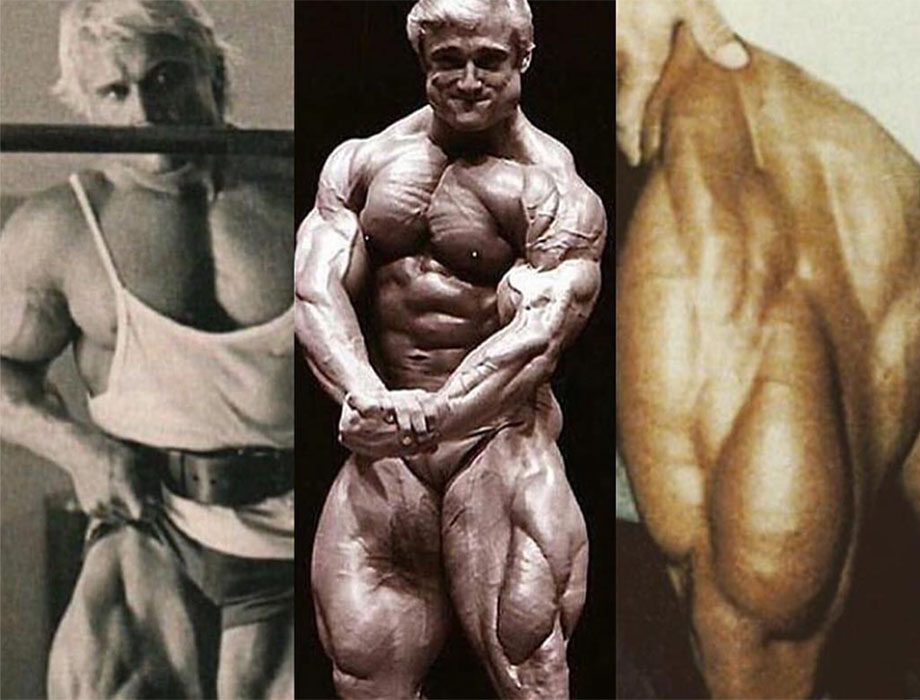
In addition to his achievements in the Mr. Olympia competitions, Tom Platz tasted success in the prestigious Mr. Universe events, securing a notable third-place finish in 1978 and attaining the coveted first-place title in 1980. These victories not only highlighted Tom Platz’s versatility but also emphasized the defining features of his career in the fiercely competitive realm of the golden era of bodybuilding, competing against the likes of Arnold Schwarzenegger and Frank Zane. He also once performed a 500-pound back squat for 23 reps.
His unwavering dedication to leg day and a distinctive and renowned training style in his bodybuilding workouts emphasized Platz’s unique approach to sculpting a legendary physique.
Tom Platz Leg Workout
On to the main event. Go ahead and clear your eyes; you’re seeing this correctly—30 to 40-plus total sets of a high-rep, leg-chiseling action in this lower body gauntlet.
This workout, pulled courtesy of BarBend, was crafted to grow leg muscles and push training endurance to new heights. Luckily, Platz was methodical when developing this routine and selecting his go-to leg exercises.
If you aren’t up for the grueling challenge that is Tom Platz’s leg workout, don’t fret—I’ve locked down some easy modifications for you later on. Also, I’d highly suggest you warm-up first before engaging in training of this volume.
| Exercise | Sets | Reps |
| Back Squat | 8-12 | 5-20 |
| Hack Squat | 5 | 10-15 |
| Leg Extensions | 5-8 | 10-15 |
| Lying Hamstring Leg Curls | 6-10 | 10-15 |
| Standing Calf Raise | 3-4 | 10-15 |
| Seated Calf Raise | 3-4 | 10-15 |
Now that you’ve explored this leg-pumping workout, let’s break down the exercises and dive into the rationale behind each movement.
Back Squat
Why do it: The back squat may not isolate muscles like leg extensions or hamstring curls, but they offer a distinct advantage in overall strength and engagement. This compound exercise allows for heavier loads, developing your quadriceps, hamstrings, and glutes, and engaging the core and stabilizing muscles.
Adjusting foot placement or stance can target specific muscle groups, like the quadriceps. The versatility of back squats makes them fundamental for building strength and muscle mass in the lower body.
How to do it:
- Load your weight, then position your hands on a racked barbell just outside shoulder width.
- Step under the bar, squeeze your traps, and rest the barbell on your upper back.
- Step back from the squat rack, standing firmly with your feet hip-width apart.
- Brace your core, bend your knees, and descend into a squat (aim for 90 degrees).
- Drive through your feet to stand back up.
- Repeat for desired reps then rerack the barbell between sets.
Expert tip: Perform your sets of squats with a controlled tempo for the best muscle engagement.
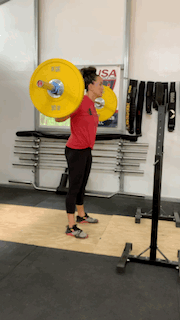
Hack Squat (Machine)
Why do it: Utilizing the hack squat machine doesn’t require your upper body to stabilize a barbell as needed with back squats. Why does this matter? You can move heavier weights for more volume. Like back squats, you can position your feet closer to target your quadriceps or widen your feet to focus on your glutes and adductors.
This combination allows for more muscle-building reps while enhancing your strength. A leg press is an effective substitute if your gym doesn’t have a hack squat machine. You can also perform a hack squat using a barbell.
How to do it:
- Select your preferred weight, then position yourself inside the machine with your back against the pad.
- Place your feet hip-width apart on the platform.
- Hold the handles or sides of the machine for stability.
- Bend your knees and lower your body, keeping your chest up and back flat. Aim to lower until your thighs are parallel to the ground.
- Push through your feet to lift the platform and return.
- Repeat for desired sets and reps
Expert tip: Knock out a set or two of hack squats without pausing between reps (unbroken reps) to fatigue your muscles.
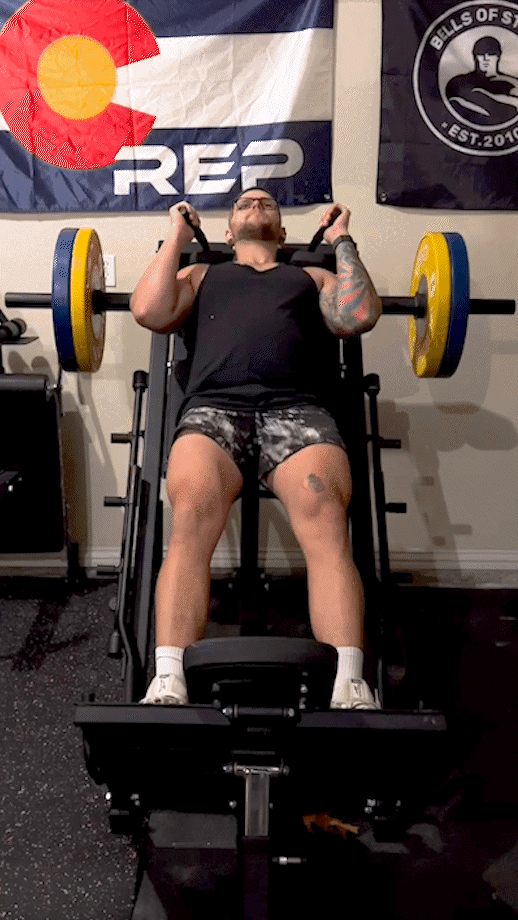
Leg Extension
Why do it: Leg extensions allow you to target your quads directly, developing chiseled legs and giving the vastus medialis that teardrop appearance. Compound exercises are great for building strength and muscle mass, but they don’t allow you to isolate muscle groups for focused reps. This is why leg extensions are an excellent supplement to squeeze out extra quad-focused reps in any muscle-building program. That said, if you do wish to isolate this movement, you can do so by working one leg at a time.
How to do it:
- Select your preferred weight and sit against the machine, aligning the pad with your ankles.
- Straighten your legs, lifting the padded lever by engaging your quads.
- Squeeze your quadriceps at the top without locking your knees.
- Lower in a controlled manner to the starting position.
- Complete the desired sets and reps.
RELATED: How to Do Leg Extensions At Home
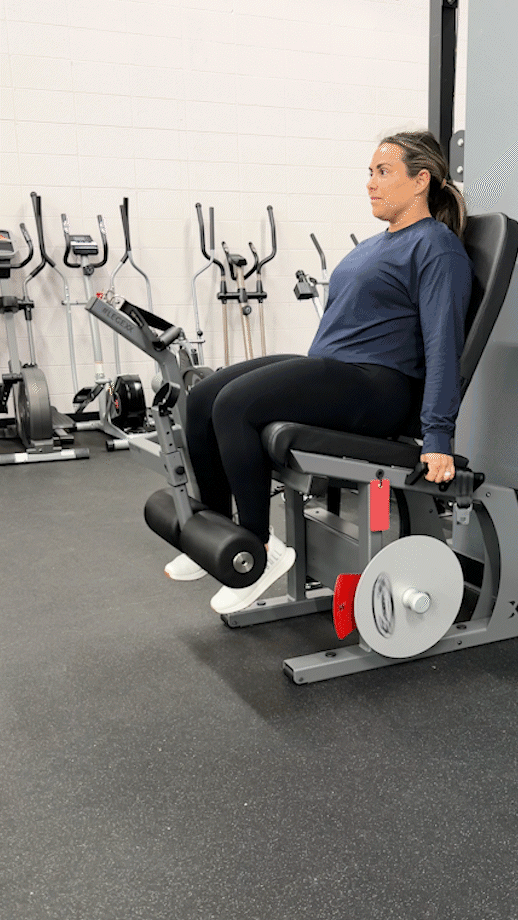
Lying Leg Curls
Why do it: Hamstring curls might not boost your strength like an RDL workout or deadlift variations, but leg curls are effective for developing muscle mass by isolating the muscle group, particularly the sartorius. A study published in April 2021 in Medicine and Science in Sports and Exercise1 highlighted that the lying hamstring curl resulted in more significant growth of the sartorius muscle compared to its seated counterpart.
Foot positioning also plays a pivotal role in hamstring development, with a wider placement focusing on the lateral hamstrings and a closer position targeting the medial (inside) hamstrings.
How to do it:
- Select your preferred weight and lie face down on the leg curl machine.
- Position your ankles under the pad.
- Curl your legs upward, bringing your heels towards your glutes.
- Squeeze your hamstrings at the top.
- Lower the roller pad down with control.
- Repeat for desired sets and reps.
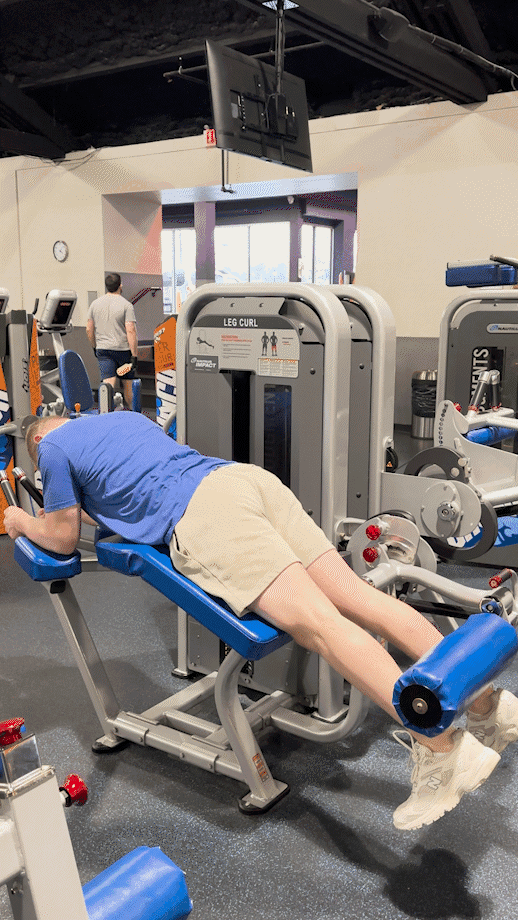
Standing Calf Raise
Why do it: Calf exercises play a crucial role in lower leg development; selecting the appropriate variation aligning with your goals is essential. The standing calf raise builds muscle mass in the gastrocnemius, the prominent and visible calf muscle. This variation enables a full range of motion, delivering an enhanced stretch and contraction stimulus to the lower legs for calf development.
Experiment with two-leg and single-leg variations, tempos, and pauses at peak contraction to vary the training stimulus.
How to do it:
- Stand with your feet hip-width apart.
- Place the balls of your feet on the edge of a step or platform.
- Rise onto your tiptoes, squeezing your calf muscles.
- Gradually lower your heels below the step, feeling a stretch.
- Repeat for desired sets and reps.
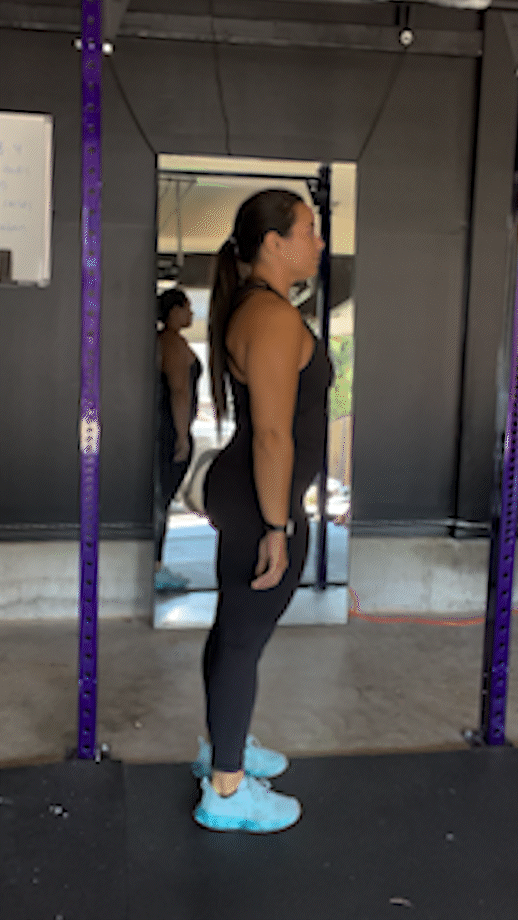
Seated Calf Raise
Why do it: The seated calf raise explicitly targets the soleus’s development, the deeper muscle of the calf in your lower leg. Due to being positioned in a seated stance, this variation deliberately minimizes the involvement of the gastrocnemius, emphasizing activation and engagement of the soleus muscle. Focus on a strong contraction at the top of each rep and a slow lowering to really drive gains in size and strength.
Integrating standing and seated variations into your lower-body workouts is critical to achieving a well-rounded and comprehensive development of your lower legs. Additionally, if you don’t have access to a calf raise machine, you can still do this exercise with a barbell across quads.
How to do it:
- Select your preferred weight and sit on a calf raise machine with your feet positioned on the platform.
- Push through the balls of your feet, lifting your heels.
- Squeeze your calf muscles at the top.
- Lower your heels below the platform for a stretch.
- Repeat for desired sets and reps.
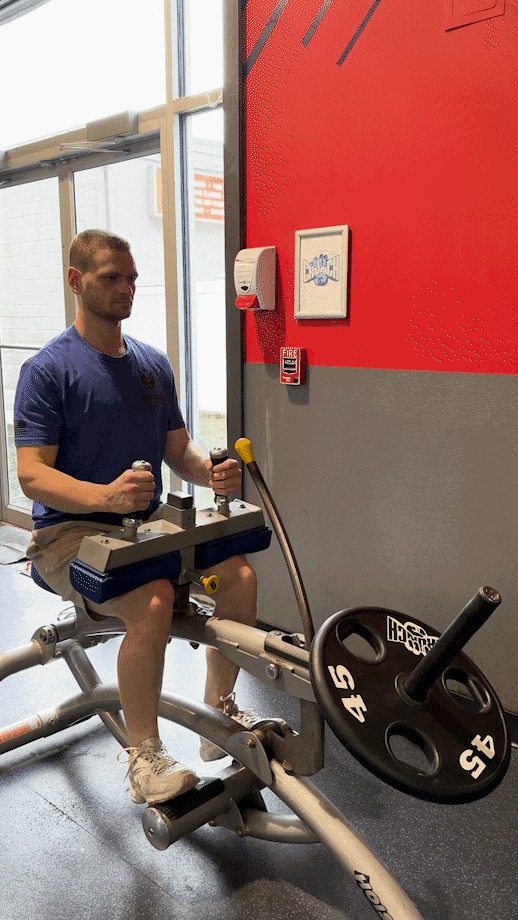
Tom Platz Leg Workout Benefits
Exercise Sequence
Tom Platz’s leg workouts were ordered in an optimal sequence, focusing on multi-joint compound exercises first, then exhausting the muscles with high-volume single-joint exercises. Starting your workouts with compound lifts first allows for greater increases in strength. A December 2017 study in Frontiers of Physiology2 showed that multi-joint exercises are best for increasing measures of strength and recruiting a more significant number of muscle fibers via neural adaptations. This allows for greater muscle activation during compound lifts and carries over into your following single-joint, isolated exercises.
In addition to enhancing strength and muscle recruitment, knocking out sets and reps of strength exercises followed by isolated movements increases your ability to exhaust your muscle groups, which can lead to improvements in muscular size3 and endurance4.
Variable Reps—Strength, Size, and Endurance
You’ll rarely find a training program with loading recommendations5 that target the three principal muscular adaptations of resistance training. In this workout plan, you’ll work through strength-focused rep and hypertrophy-inducing rep ranges and finish the workouts with high-volume training that targets muscular endurance. This concept keeps every workout challenging and helps you avoid stagnant sessions, increasing creativity and fun!
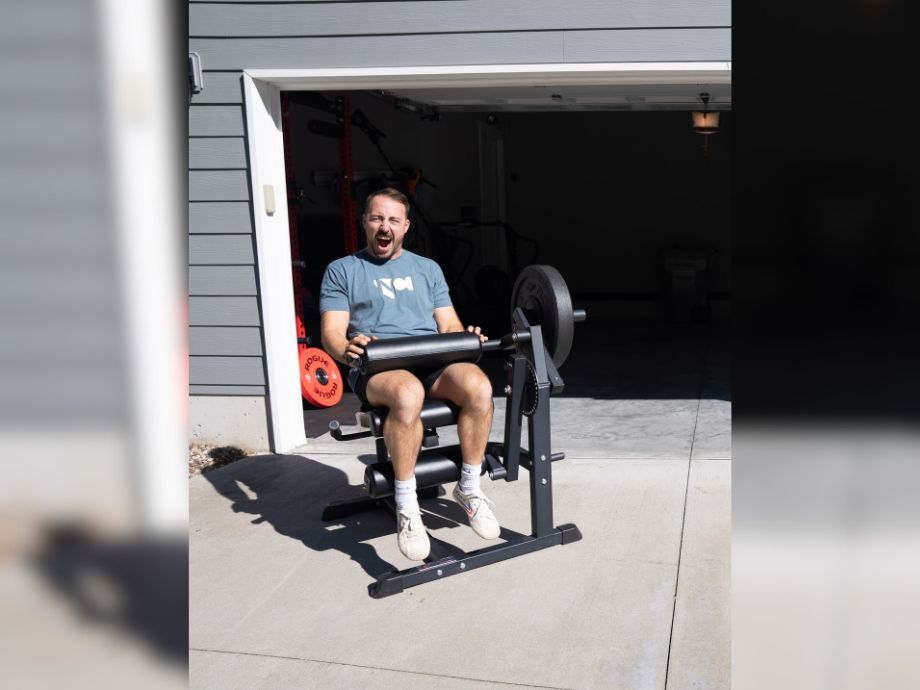
By incorporating variable reps into a training program, you can optimize your workouts for a well-rounded approach, targeting different energy systems and physiological adaptations.
RELATED: How Many Reps to Build Muscle
Targets All of Your Leg Muscles
Tom Platz’s leg workout is like an all-inclusive stay for leg training—in one gym session, you’ll target multiple muscles6 in your lower body, bolstering strength, size, and endurance.
Back squats start your sessions and are the lead compound lift for a reason, targeting your quads, glutes, hamstrings, calves, and adductors with each rep. Shifting to hack squats will reap the same benefits of a back squat but allow you to train with more volume and potentially more weight.
RELATED: 10 Best Leg Exercises
Follow those two lifts by shifting gears and crushing isolated lifts for your quads, hamstrings, and calves. No muscle fiber goes unburned in this dynamic leg workout.
How to Modify the Tom Platz Leg Workout
After looking closer at the Tom Platz leg workout, you wouldn’t be wrong in thinking it’s a little extra. Tom Platz was training for competition, after all. Here’s how you can take the principles of the leg workout above and adapt them to suit your training needs.
Beginner to intermediate-Friendly
Jumping right into Tom Platz’s leg workout might not be the best choice for most gym-goers, especially beginners and those in the intermediate stage. Constructing a beginner workout plan inspired by Platz’s leg day involves a careful and safe progression. Starting gradually is vital, and my top recommendation is trimming the volume.
RELATED: What is Progressive Overload?
By incorporating correct progressions and a dose of balanced volume, you’ll be heading toward an effective and sustainable leg training routine. Check out the modifications below. I dropped the volume considerably and gave you better exercise options to boost your base strength.
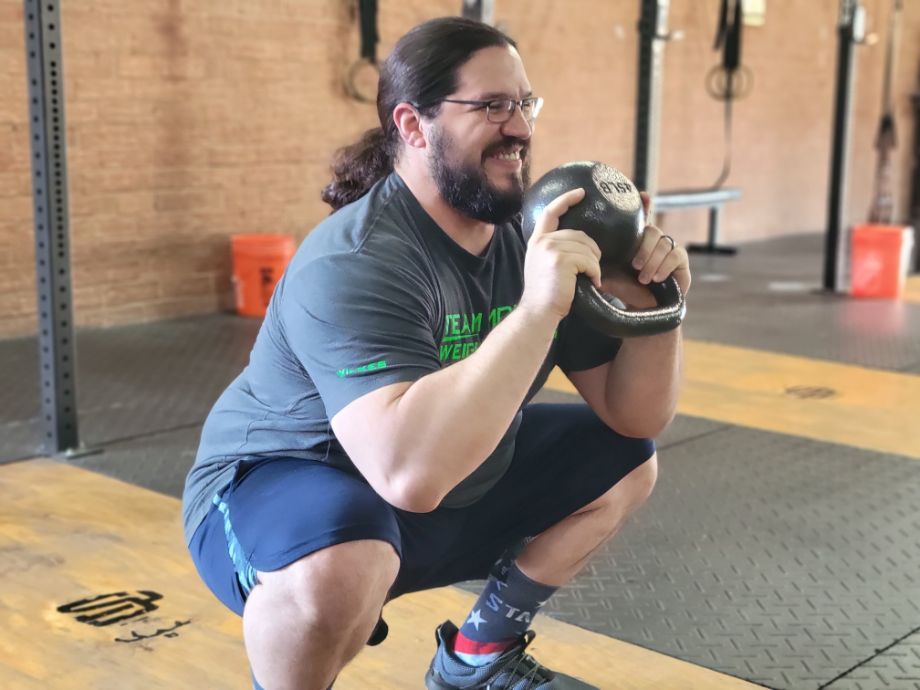
This beginner workout will build the foundation of movement and strength. These exercises will allow you to progress movements from the beginner to the intermediate workout. The volume is lower, allowing you to increase intensity (weight lifted) weekly and focus on good form.
Beginner Workout
| Exercise | Sets | Reps |
| Goblet Squat | 3 | 5-8 |
| Lunges | 3 | 8-12, per side |
| Leg Extensions | 3 | 8-12 reps |
| Leg Curls | 3 | 8-12 reps |
| Seated Calf Raise | 3 | 8-12 reps |
The intermediate workout progresses in exercises allowing lifters to train with more advanced movements. More barbell work, more volume, and more intensity.
Intermediate Workout
| Exercise | Sets | Reps |
| Back Squat | 4 | 5-12 |
| Bulgarian Split Squat | 3 | 10-15, per side |
| Leg Extensions | 3 | 10-15 |
| Leg Curls | 3 | 10-15 |
| Standing Calf Raise | 3 | 10-15 |
No Machines, No Problem
Like the title says—no machines, no problem. I mentioned I had some coach-approved modifications for you, and I’ll keep my word! While this workout doesn’t involve machines, it still targets the same muscle groups—quads, hamstrings, and calves—and retains the same goals Tom had with his OG leg workout. The volume stays the same as you knock out sets and reps of these effective alternatives for your leg day workout.
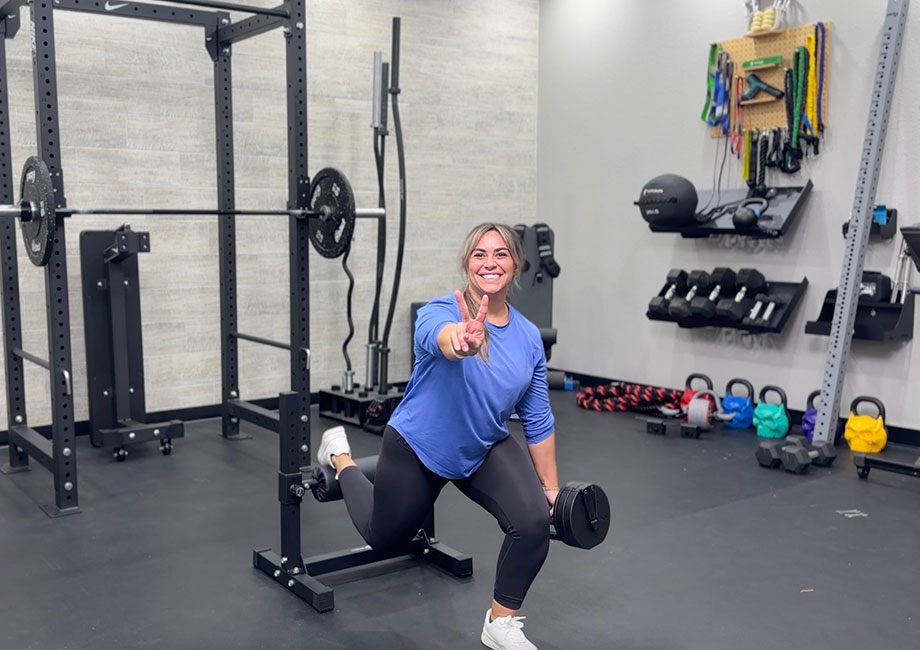
Snag a pair of the best adjustable dumbbells and get after it.
| Exercise | Sets | Reps |
| Back Squat | 8-12 | 5-20 |
| Bulgarian Split Squat | 5 | 10-15, per side |
| Heel-Elevated Goblet Squat | 5-8 | 10-15 |
| Seated Band Leg Curl | 6-10 | 10-15 |
| Dumbbell Standing Calf Raise | 3-4 | 10-15 |
| Seated Calf Raise | 3-4 | 10-15 |
RELATED: Leg Extension Alternative
Tom Platz Leg Workout: Final Thoughts
Tom Platz’s leg workout routine helped define his illustrious career (and his legs), etching his name in bodybuilding history. Here are a few key takeaways from analyzing the leg day routine.
- This leg workout is tough and might not be for everyone, so modify it appropriately.
- Tom Platz’s squat workout works through reps for strength, size, and endurance.
- Squats are complemented with isolation exercises—leading to optimal growth.
- The order of exercises works through compound lifts and leads to isolated movements.
- The varying rep ranges allow you to train for strength, size, and endurance in one workout.
- No lower-body muscle goes untrained with this routine.
Tom Platz Leg Workout: FAQs
How many Mr. Olympias did Tom Platz win?
Tom Platz placed third in the 1981 Mr. Olympia, garnishing the best result of his career. Although Platz never won a Mr. Olympia, he did finish in the top 10 six times during his competition career, slightly missing an 11th top 10 finish in 1986. His crowning achievement came in the 1980 Mr. Universe, where he emerged victorious and claimed the coveted first place.
What did Tom Platz eat?
Tom Platz’s diet plan consisted of high-protein red meat, whole eggs, cottage cheese, and milk—staples of the golden era of bodybuilding. He would complement these items during his in-season phases with nuts, fruits, oats, and other carbohydrate-dense foods. In the off-season, he was much more relaxed, often consuming foods such as burgers and ice cream to help pack on extra mass.
RELATED: Vertical Diet
How big are Tom Platz’s thighs?
At his peak, Tom Platz’s thighs measured over an astounding thirty inches—gaining him the nicknames “The Quadfather” and “Quadzilla.” He was notoriously known for his leg development, accredited to intense workouts, a mixture of high-volume squats, leg curls, leg extensions, calf raises, and many hours spent in the gym.
References
- Maeo S, Huang M, Wu Y, et al. Greater Hamstrings Muscle Hypertrophy but Similar Damage Protection after Training at Long versus Short Muscle Lengths. Med Sci Sports Exerc. 2021;53(4):825-837. doi:10.1249/MSS.0000000000002523
- Paoli A, Gentil P, Moro T, Marcolin G, Bianco A. Resistance Training with Single vs. Multi-joint Exercises at Equal Total Load Volume: Effects on Body Composition, Cardiorespiratory Fitness, and Muscle Strength. Front Physiol. 2017;8:1105. Published 2017 Dec 22. doi:10.3389/fphys.2017.01105
- Schoenfeld BJ, Contreras B, Krieger J, et al. Resistance Training Volume Enhances Muscle Hypertrophy but Not Strength in Trained Men. Med Sci Sports Exerc. 2019;51(1):94-103. doi:10.1249/MSS.0000000000001764
- Hughes DC, Ellefsen S, Baar K. Adaptations to Endurance and Strength Training. Cold Spring Harb Perspect Med. 2018;8(6):a029769. Published 2018 Jun 1. doi:10.1101/cshperspect.a029769
- Schoenfeld BJ, Grgic J, Van Every DW, Plotkin DL. Loading Recommendations for Muscle Strength, Hypertrophy, and Local Endurance: A Re-Examination of the Repetition Continuum. Sports (Basel). 2021;9(2):32. Published 2021 Feb 22. doi:10.3390/sports9020032
- National Academy of Sports Medicine. Biomechanics of the Squat. NASM Blog. [accessed January 20, 2024]. Available from: https://blog.nasm.org/biomechanics-of-the-squat
Further reading

A sports nutrition coach explains the best time to drink a protein shake for weight loss. Read more

You don’t earn a nickname like “The Quadfather” by skipping leg day.Renowned for his unparalleled leg development, Tom Platz’s name is synonymous with the epitome of strength and sculpted lower body musculature in the realm of professional bodybuilding—just google his name and see for yourself if you’re unfamiliar with the massive quads and chiseled V-taper of “The Golden Eagle.” Tom Platz’s leg workouts echo through fitness circles as a testament to his legendary dedication to leg training and influence on many workout routines. » Read more about: The Tom Platz Leg Workout: A Path to Becoming The Quadfather » Read more

Being in a calorie deficit means you’re burning more calories than you eat. It’s the only way to lose weight, but what are the other health implications? Read more

The Fitbit Ionic is one of the best activity tracking smart watches available on the market today. With Fitbit's encouragement to accomplish fitness goals, an exercise tracker to understand just how fit you are, and multiple day battery life, the Fitbit Ionic should not go overlooked when looking for an activity tracking smart watch. Read more

